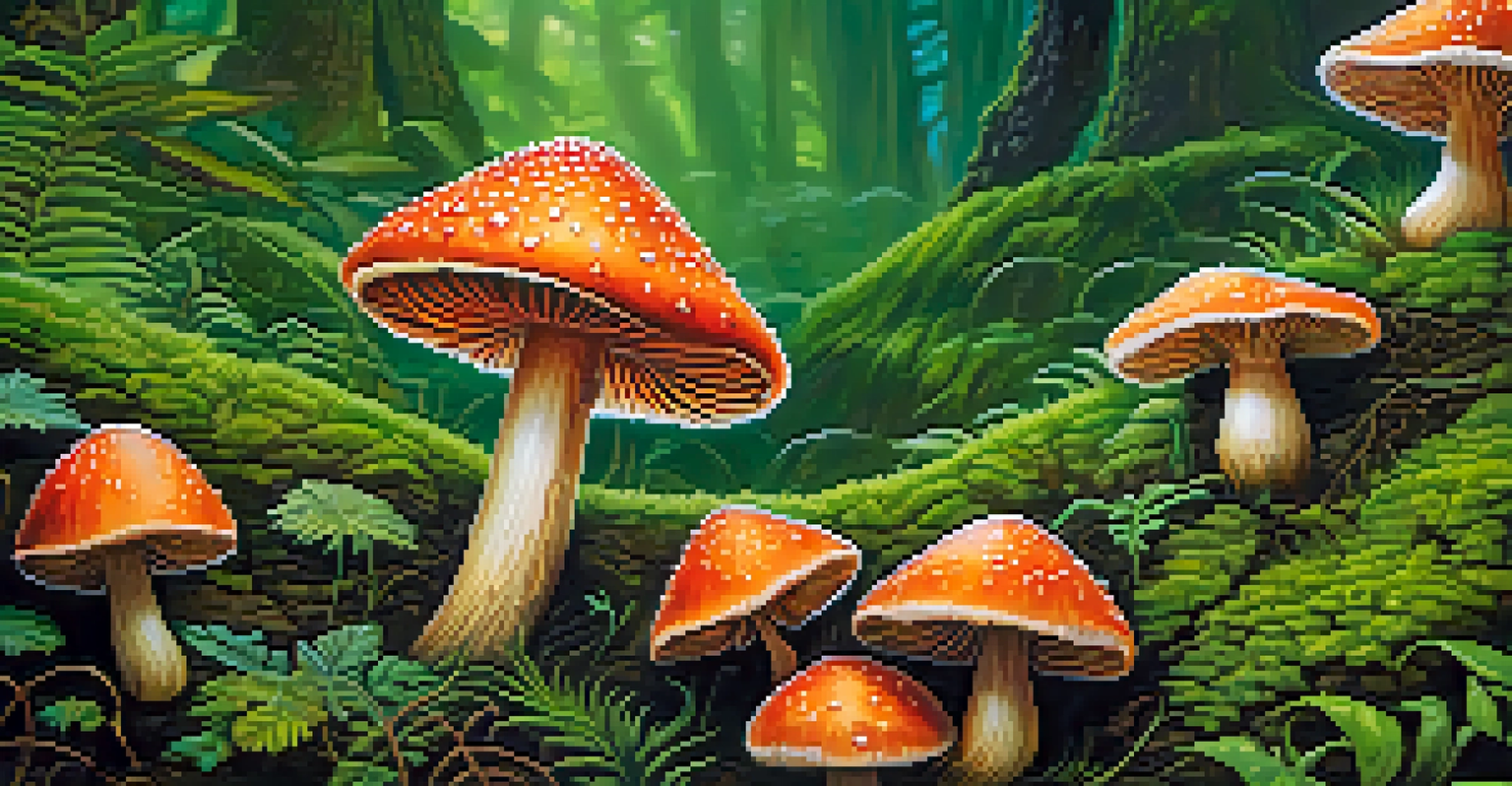Psychedelics and the Brain: Healing Mental Health Issues

Understanding Psychedelics and Their Effects
Psychedelics are substances that alter perception, mood, and cognitive processes. Common examples include psilocybin, LSD, and ayahuasca. These compounds have been used for centuries in various cultures for spiritual and healing practices.
Psychedelics can provide a unique opportunity for introspection and emotional breakthroughs that can facilitate healing.
Recent research has reignited interest in their therapeutic potential, particularly in treating mental health disorders like depression, anxiety, and PTSD. Unlike traditional medications, psychedelics interact with serotonin receptors in the brain, leading to profound changes in consciousness.
Related Resource
This altered state can facilitate deep introspection and emotional breakthroughs, helping individuals tackle issues that may have been buried for years. Understanding how these substances work in the brain is crucial for recognizing their potential benefits.
The Science Behind Psychedelics and Mental Health
Studies show that psychedelics can promote neuroplasticity, the brain's ability to adapt and reorganize itself. This is particularly important for individuals suffering from mental health disorders, as it allows for new thought patterns and behaviors to emerge. For example, research has indicated that psilocybin can help 'reset' the brain's default mode network.

This network is often overactive in individuals with depression and anxiety, leading to negative thought cycles. By disrupting these patterns, psychedelics can create space for healthier perspectives and coping mechanisms.
Psychedelics Enhance Mental Health
Research shows that psychedelics can promote neuroplasticity, potentially helping to treat mental health disorders like depression and anxiety.
Furthermore, the experience of taking psychedelics often leads to a sense of connection and understanding, which can be profoundly healing. This communal aspect may also provide a support system for individuals on their mental health journeys.
Therapeutic Uses of Psychedelics in Treatment
Psychedelics are emerging as promising tools in psychotherapy, especially when combined with guided sessions. For instance, studies have shown that MDMA can enhance emotional engagement, making it easier for patients to process traumatic memories during therapy.
The therapeutic potential of psychedelics is only beginning to be understood, and the future holds great promise for mental health treatment.
Similarly, psilocybin-assisted therapy has demonstrated significant reductions in depression and anxiety among cancer patients, allowing them to confront their fears related to illness and mortality. This therapeutic approach creates a safe space for individuals to explore their emotions.
Related Resource
As more clinical trials are conducted, the evidence supporting the therapeutic application of psychedelics continues to grow, suggesting a paradigm shift in how we approach mental health treatment.
Potential Risks and Considerations
While the benefits of psychedelics are promising, it's important to acknowledge potential risks. Not everyone is a suitable candidate for psychedelic therapy; individuals with certain mental health conditions, such as schizophrenia, may experience adverse effects. Therefore, thorough screening and professional guidance are essential.
Additionally, the setting in which psychedelics are consumed greatly influences the experience. An uncomfortable or unsafe environment can lead to negative experiences, often referred to as 'bad trips.' This highlights the need for controlled settings and trained facilitators during therapeutic sessions.
Therapeutic Integration is Key
Proper integration of psychedelic experiences with therapeutic support is crucial for maximizing their healing benefits.
Thus, while psychedelics hold incredible potential for healing, they should be approached with caution and respect, ensuring that safety and wellbeing remain a priority.
The Role of Integration in Psychedelic Therapy
Integration is a crucial aspect of psychedelic therapy, referring to the process of making sense of the experiences and insights gained during sessions. Without proper integration, individuals may struggle to apply their revelations to everyday life, potentially diminishing the therapeutic benefits.
Therapists often work with clients post-experience to help them reflect on their journey, fostering a deeper understanding of their emotions and behaviors. This collaborative process can be transformative, enabling individuals to create actionable steps toward healing.
Related Resource
Moreover, integration encourages ongoing support and community, which can be vital for those navigating their mental health challenges. By bridging the gap between the psychedelic experience and daily life, integration enhances the overall effectiveness of treatment.
Cultural Shifts and Acceptance of Psychedelics
The stigma surrounding psychedelics is gradually fading as society recognizes their potential benefits. Cultural shifts, driven by scientific research and personal testimonials, are paving the way for more open discussions about mental health and alternative treatments.
As influential figures, such as researchers and mental health advocates, share their experiences, public perception is shifting. This newfound acceptance is critical for fostering a supportive environment where individuals feel comfortable exploring psychedelic therapies.
Cultural Acceptance is Growing
The stigma around psychedelics is diminishing as society increasingly recognizes their therapeutic potential and shifts towards open discussions.
Furthermore, as legal frameworks around psychedelics evolve, access to these treatments may become more widespread, providing hope for those who have struggled with conventional therapies.
Future Directions in Psychedelic Research
The future of psychedelic research is promising, with many studies ongoing to explore their full potential. Researchers are delving into various compounds, dosages, and therapeutic settings to determine the most effective approaches for different mental health conditions.
As our understanding of the brain and psychedelics deepens, we may uncover new mechanisms of action that could further enhance their therapeutic applications. This could lead to personalized treatment plans tailored to individual needs and circumstances.

Ultimately, the goal is to integrate psychedelics into a broader mental health care framework, combining them with traditional therapies to create a holistic approach to healing. The journey has just begun, and the possibilities are vast.